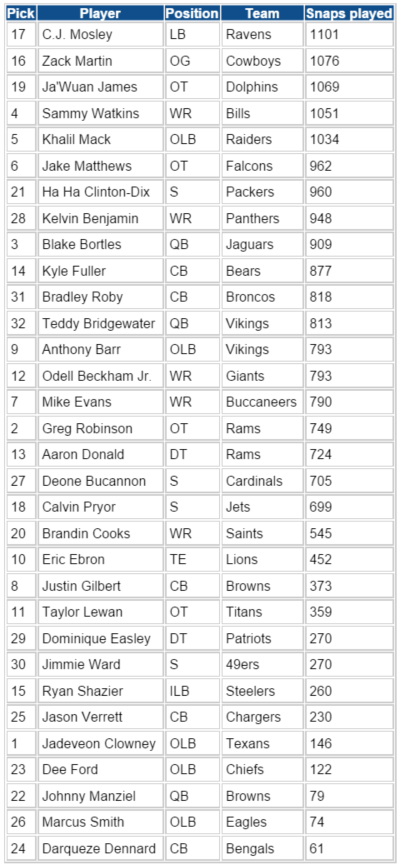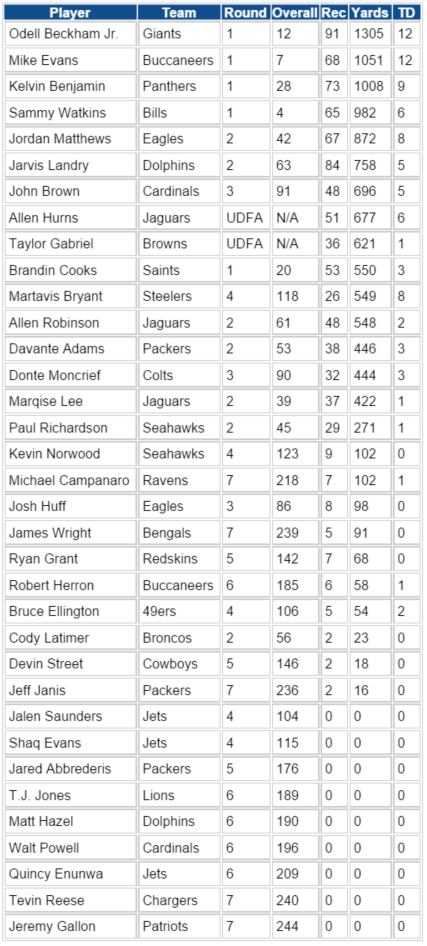
January 05, 2015
The 2012 and 2013 draft classes were very good ones for the Eagles. The 2014 class so far... Bleh. Below we'll take a look at what the 2014 class did in their rookie seasons.
There's an adage that players entering the NFL should be given three years before you can pass judgment on them. It's an adage I don't buy. Rookie seasons matter, particularly from first round picks. While you would prefer your first round pick be able to step right in as a starter, it's not necessarily “a must” for it to be a successful rookie campaign. However, at a minimum, any first round pick, even if he struggles at times, should at least show flashes of ability in the opportunities he gets. In Smith's first year in the league, we saw nothing. Like, literally... nothing. Here were Smith's stats on the season:
Part of that nothingness was because Smith couldn't get on the field. He played just 74 snaps, which was the second lowest total in the league among rookie first round picks.
If you include special teams snaps, of which Smith played none,
it was the lowest snap total among rookie first round picks. As a first round pick, Smith unquestionably has athletic ability. So why couldn't he at least get on the field to play specials? Players who excel at special teams often do so because they want to. Does Smith have the drive to help his team in any way possible? It's concerning that he was left on the sidelines on special teams in favor of guys being signed mid-season off the street.
And finally, what is he? Is he an OLB? An ILB? Some sort of mix of both? If so, that kind of versatility will be valuable, but obviously, Smith wasn't good enough at either position to get on the field. His role in the defense heading into next season is unclear.
One year into his NFL career, while it's way too early to close the book on him, Marcus Smith has been an obvious disappointment.
Matthews finished second (all to Jeremy Maclin) on the team in receptions, yards, touchdowns, receptions of 20+ yards, and yards per catch (min. 10 catches). He was easily the Eagles' second most effective weapon in the passing game on a roster with plenty of good receiving threats.
The 2014 draft produced a potentially amazing crop of wide receivers, led by guys like Odell Beckham Jr., Sammy Watkins, and Mike Evans. As a result, Matthews' impressive rookie season is somewhat lost among the stellar performances of some other rookie wide receivers. Matthews served as a #3 WR and still produced the 5th most receiving yards among this incredible WR class:
His 872 receiving yards fell just 40 yards short of DeSean Jackson's Eagles rookie receiving record in 2008, while operating almost solely out of the slot.
Matthews is clearly the Eagles' best pick of the 2014 draft so far.
Huff made a lot of rookie mistakes in 2014. He had a devastating fumble that cost the Eagles points in a close game against the Cardinals, a dropped pass that resulted in an INT against the Texans, and was involved in (although not necessarily responsible for) that weird opening kickoff against the Cowboys that was the equivalent of 55 yard onsides kick recovery. Huff's rookie season will largely be looked at as a bad one, because of the very costly errors he made.
However, according to a source, the Eagles remain quite high on him, and you can see why from the perspective of projecting what he may be as a player going forward. He's an explosive runner with good speed who can break tackles. Below is his 107 yard opening kick return against the Titans:
Huff does not appear to be a natural pass catcher. Some receivers make it look easy, while it often looks like Huff is fighting the ball. He is already a good kick returner, and if his hands can improve, Huff can be a dynamic threat in the Eagles' offense.
Watkins is difficult to evaluate at this point. In 2014, he learned three secondary positions -- Cornerback (outside), slot corner, and safety. That's not easy to do as rookie and be able to contribute immediately. Watkins had a few rough moments in the preseason games, most notably when he was toasted deep by the Bears' reserves. He did not see any action with the regular defense at all until the Week 17 "finale" against the Giants. There was more down than up in that game, but he at least flashed some ability when he had a nice pass breakup of a ball intended for Odell Beckham Jr.
Chip Kelly said he would have drafted Hart in the third round, and it was thought (by me, anyway) that he could contribute in some form from Day 1. Nope. Hart never saw the field in 2014, as he was a healthy scratch for all 16 games.
Reynolds couldn't even make the team playing a position where the Eagles have a major weakness. He spent the 2014 season on the practice squad, meaning no other teams around the league likely had any interest in adding Reynolds to their roster either.
Allen played the third-most snaps of any of the Eagles' rookies, with 201, behind Matthews and Huff. He played 127 more snaps than first round pick Marcus Smith. Allen did not make much of an impact his rookie season, but at a minimum he appears to be a solid seventh round pick.
Parkey had a good rookie season, hitting 32 of 36 field goal attempts, including hitting 4/4 from 50+ yards. He was also an upgrade over Alex Henery on kickoffs, hitting 46.9% of his kickoffs for touchbacks (an average percentage, but certainly much better than Henery). The lasting memory of Parkey this season, however, may be that he missed 34 and 46 yard field goals is the Eagles' playoff-destroying loss Week 16 to the Redskins.
Burton was the only undrafted rookie free agent who spent the entirety of training camp with the Eagles to make the team. He proved to be a valuable special teams player, and could potentially evolve into a "do everything" type of role player in the regular offense.
Follow Jimmy on Twitter: @JimmyKempski


